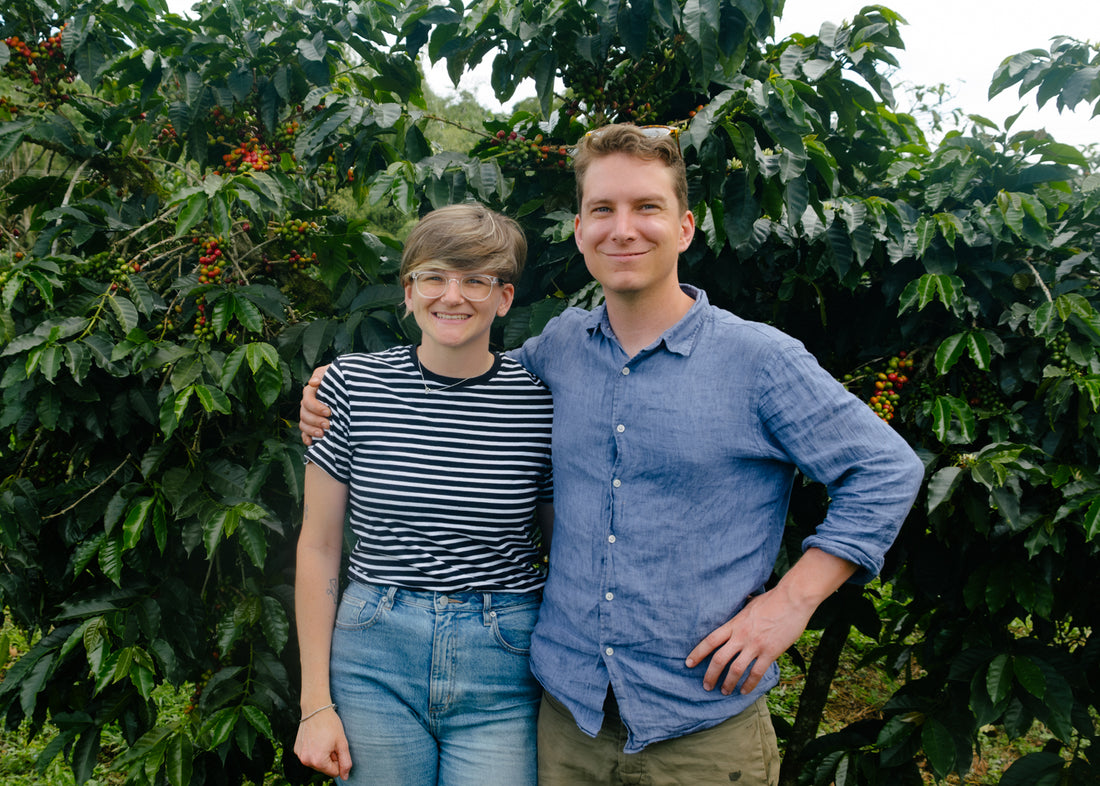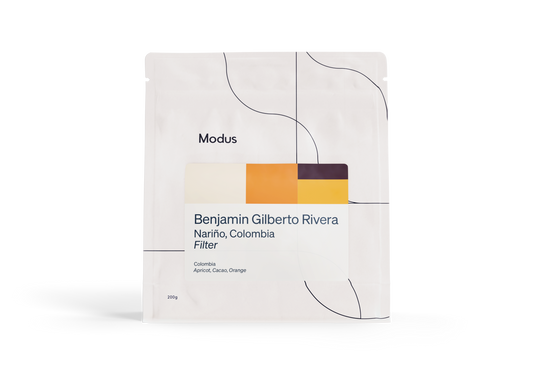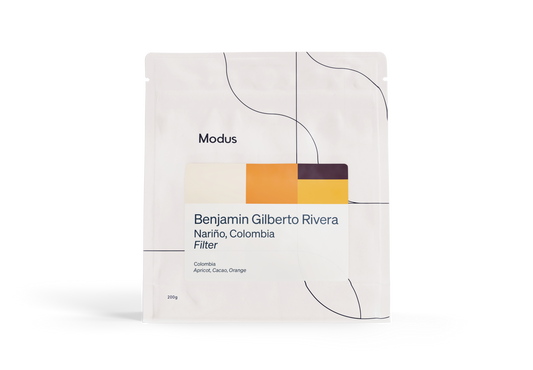For as long as I have had memories I’ve always loved coffee, I can remember stealing sips from my year four teacher's cup whenever he left the room. My first job out of school was in the local café at the end of my street, back then all you had to do to make better coffee than the rest of the staff was to care more and I did, so I became a barista. I’ve been working in coffee since 2004 and it was this year, 2019 that I visited a proper coffee farm for the first time.
Travelling to origin is hands down the best thing I’ve ever got to do for work, Modus was lucky enough to be invited by Cofinet to go to Colombia and visit the farms and farmers first hand, to taste the fruit from the same coffee trees that we have had such pleasure in roasting and serving in our café in Perth. Fortuitously for myself and our Head Roaster, Rachel Elliott, we were soon on our way to rural Colombia for an unforgettable adventure full of incredible scenic nature and generous homestyle hospitality.


Cofinet is an incredible family-run operation started by Colombian brothers, Felipe and Carlos in 2015. They now operate as an Importer/Exporter based in Sydney and Armenia (Colombia) who focus not only on sourcing and growing great quality coffees but also invest heavily in the farms and communities all over Colombia by providing equipment, training and resources to farmers that show potential and a desire to learn. It was through Cofinet that we were introduced to Luis Anibal’s incredible washed Caturra that we now serve as our house coffee, as well as several incredible exotic grade coffees like the Pink Bourbon and Geisha all grown on the same family-run farm in Huila. This was the beginning of Modus’ direct relationship with Luis Anibal which guarantees more money for the farmer and a transparency of quality and farming practices for us, we have Cofinet to thank for making this all possible.
After what can only be described as fairly gruelling 48-hour transit from Perth (to Sydney, Sydney to Dallas, Dallas to Bogota, Bogota) to Armenia we were picked up by Felipe from the small rural airport and taken to La Pradera, the family estate which even when it's not housing excited coffee tourists is a full-time coffee mill. This includes the surrounding farms which the family owns and runs, drying facilities (both automated and standard drying beds), training and education rooms, a coffee sample roastery and the day-to-day workplace of their incredible QC and office staff.
Waking up every morning at 7 am, surrounded by 360-degree views of lush green rolling hills embedded in a valley of coffee farms to be fed what can only be described as a fresh, straight from the tree, orgasmic plethora of tropical fruits (Colombia has one of the world's largest biodiversities of edible fruits!) for breakfast, before making our way down to the QC rooms for 3 hours of coffee tasting is one of the more delightful ways to spend a work day. The opportunity to sit in a room with the talented coffee professionals that work for Cofinet and discuss what we taste, why we taste, all of the different farming regions and modern processing techniques was such an incredible raw connection to make after a lifetime of working in coffee.
I've always told anyone that would listen, to appreciate the efforts in coffee (handling, sorting preparation) that happen at origin to make sure that we end up with a perfect consistent cup of coffee every time. But nothing can prepare you for watching a line of 8–12 people all sorting different, similarly ripened fruits into separate buckets ALL DAY LONG. Once they finish sorting their bucket into two "more ripe/less ripe" buckets they swap buckets with the other people in the line and start sorting again, repeated ad nauseum. When you see the amount of dedication and care that goes into every single bean that arrives in Australia, you'll have even more respect for the humble coffee bean and the diligent people who produce it.
One of the biggest things that struck me while we were in Colombia is how inadequate our dialogue is around different processing methods. Washed, honey and natural processes are what we have traditionally used to describe the amount of fruit that is still on the seed when the drying process takes place. Each of these methods traditionally imparted varying degrees of fermented fruit characteristics such as heavy sticky sweetness or complex acidities. Washed coffees tend to have a much cleaner cup quality and transparent acidity profiles, which is what we tend to aim for at Modus. Honey process (with most of the flesh and skin removed but the sticky membrane or mucilage remaining for the drying) will have more body and sweetness. And the natural process, in which the whole fruit is left on the seed throughout the drying phase, this method will often have very funky, "fermenty" qualities and sticky sweetness. Normally, I can smell a natural coffee if it's in the blend a cafe uses as soon as I walk in the door but cupping with Cofinet, you might as well throw these definitions out the window. Some of the cleanest coffees with the nicest most complex acidities were on the naturally processed cupping table and some of the funkiest most outrageous flavours I tasted the whole trip were on a full table of exotic (high end) washed coffees. I don’t even know what to believe in anymore...

As we adventured from farm to farm, the meticulous organisation, cleanliness and dedication to the processing methods became apparent. It seems that if they have the time, knowledge and skill, these Colombian farmers can create genre-defying coffees that showcase not only the best of terroir but add levels of complexity and body that are previously unseen in coffees from these regions and processing methods. I couldn’t help myself, I bought the two best coffees that I tasted the whole time I was there, an incredible washed Caturra from the Nariño region (a region that will have to be part of my next coffee trip) and a complexity-defying Geisha, that was fermented once it was pulped for 120 hours without oxygen from the genius farmer, Rafael Amaya. Meeting his family, experiencing his wife’s cooking and riding his homemade cable car across a 150-metre deep gorge would be reason enough to visit him alone, even if his Geisha wasn’t the single best mouthful of coffee I drank in 2019. I hope I get the opportunity to visit Rafael and his incredible family again one day.
If anything could be used to kill the excitement of our 8-day flavour adventure through this lush, picturesque mountain landscape, incredible hosts and many crushable, watery beers, it's a 55-hour travelling session from rural Huila back home to Perth. This eye-opening Colombian adventure was an incredible chance to build a greater understanding of the realities and hardships of coffee production and to strengthen greater ties with the farmers who supply us with such high quality and unique coffee experiences. I hope that we have the time and opportunity to return to Colombia again in the coming years and I’m so grateful to have been given this rare chance to see the coffee industry that I’ve been a part of for so long, through a different lens.
Tobias Glass




